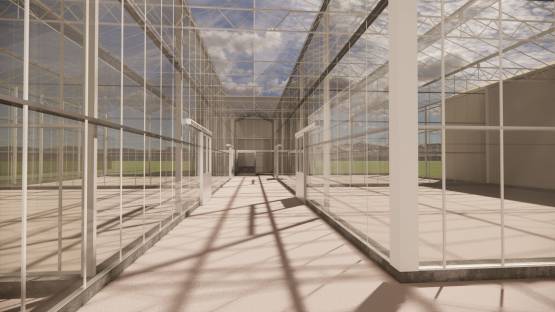Twelve countries have this week jointly pledged a total of 5.5 million Euro towards ReNuAL2, an IAEA project to upgrade the Agency’s nuclear applications laboratories in Seibersdorf, Austria. The contributions, provided by Algeria, Australia, Germany, Jordan, Kuwait, Malaysia, the Netherlands, the Republic of Korea, Slovenia, the United Arab Emirates, the United Kingdom and the United States of America, met the target of estimated funding needed for construction of new laboratory greenhouses, which are necessary for the Agency’s work in plant-breeding, food safety, soil and water management and crop nutrition.
With funding already in place for the ongoing construction of a new laboratories building and refurbishment of the Agency’s Dosimetry Laboratory, the greenhouses were the last major ReNuAL2 project element requiring funding.
“Every day, IAEA experts at our Seibersdorf labs work intensively towards finding solutions to global challenges, through the use of nuclear techniques. The planned greenhouses are critical to meeting Member States’ requests for training, research, and services to strengthen their climate resilience and food security,” said IAEA Director General Rafael Mariano Grossi. “The contributions towards the ReNuAL2 project bring us tantalizingly close to completing the modernization, ensuring that they will continue to be crucial in addressing the priorities of our Member States.”
At an event held earlier this week to mark the contributions, Mr Grossi highlighted the importance of the project’s several consistent repeat donors, and presented the first-time donors to ReNuAL2 with a national plaque, to be placed on a commemorative donor display at the IAEA headquarters in Vienna. The first-time donors to the project are Algeria, Jordan, Malaysia, the Netherlands and the United Arab Emirates. To date, 33 countries have pledged funds towards ReNuAL2.
Mr Grossi also thanked the two Co-chairs of the Friends of ReNuAL Group, Germany and South Africa, for their efforts in encouraging countries’ strong support for the ReNuAL project. The Friends of ReNuAL is an informal group of IAEA member countries supporting the laboratory renovation.
ReNuAL2 was launched in 2020 to finish the modernization of the IAEA’s Nuclear Applications laboratories in Seibersdorf, completing an effort that began in 2014 and which over the following six years delivered three major new laboratory facilities. The ReNuAL2 project phase entails the construction of a new building to house three laboratories: Plant Breeding and Genetics (PBGL), Terrestrial Environmental Radiochemistry (TERC), and Nuclear Science and Instrumentation (NSIL); as well as the refurbishment of the Dosimetry Laboratory, and replacement of the Agency’s aging greenhouses. Construction of the new building began in October last year, and major construction is due to be completed by the end of 2024.
“The extraordinary commitment of our Member States has just been demonstrated by a group of 12 countries,” said Najat Mokhtar, IAEA Deputy Director General and Head of the Department of Nuclear Sciences and Applications. “I would like to thank the UK and the US for facilitating this group effort. This joint statement speaks of the great importance these countries attach to supporting and promoting the critical role of the IAEA laboratories.”
The joint contribution leaves only smaller, non-construction costs to finish the estimated 42.3 million euro project still to be funded. The IAEA continues its efforts to mobilize resources to raise the funding needed to finalize the ReNuAL2 project.
For over 60 years, the IAEA has, through its laboratories in Seibersdorf, trained thousands of scientists in nuclear techniques, helping to address some of the world’s most pressing challenges. At the site’s eight nuclear applications laboratories experts conduct applied research and provide training and technical assistance to countries in the areas of human health, food and agriculture, environment and climate change, contributing to the IAEA’s efforts in using nuclear science and technology towards achieving the United Nations Sustainable Development Goals.







